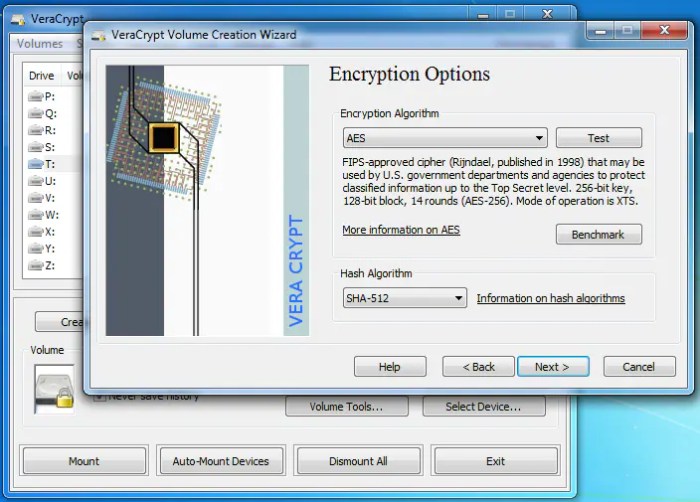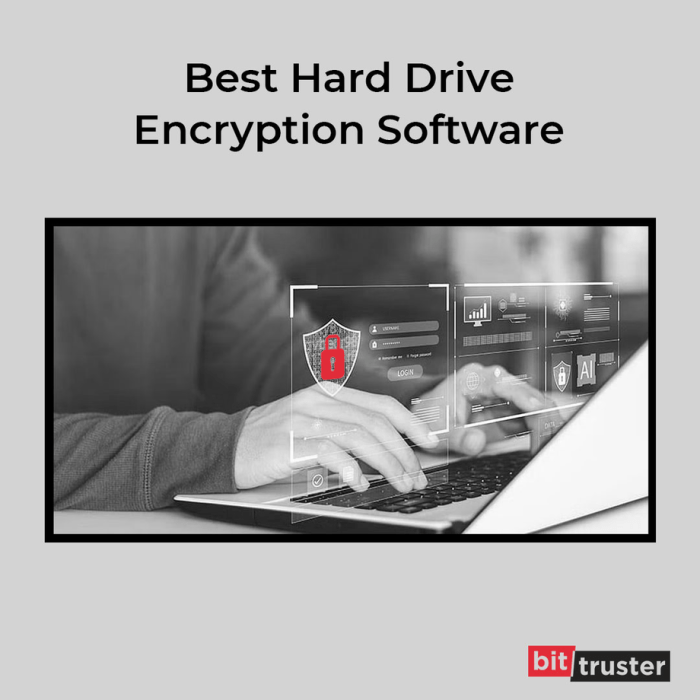In today’s increasingly digital world, protecting your sensitive data is paramount. Hard drive encryption software provides a crucial layer of security, safeguarding your personal files, financial information, and confidential documents from unauthorized access. This comprehensive guide delves into the intricacies of hard drive encryption, exploring various software options, their functionalities, and the crucial considerations for choosing the right solution for your needs.
We’ll cover topics such as full disk encryption, file-level encryption, encryption keys, and the best practices for maintaining robust data security.

Source: wondershare.com
Understanding Hard Drive Encryption: Hard Drive Encryption Software
Hard drive encryption, also known as disk encryption, is the process of converting readable data into an unreadable format, called ciphertext, using a cryptographic algorithm. This scrambled data is only decipherable with a decryption key, ensuring that even if your hard drive is stolen or compromised, your data remains protected. The strength of the encryption depends heavily on the algorithm used and the length of the key.
Stronger algorithms and longer keys offer greater protection against brute-force attacks.
Types of Hard Drive Encryption
- Full Disk Encryption (FDE): This encrypts the entire hard drive, including the operating system, applications, and all user data. It’s the most comprehensive form of protection, offering robust security against data breaches. Popular examples include BitLocker (Windows) and FileVault (macOS).
- File-Level Encryption: This encrypts individual files or folders, allowing you to selectively protect sensitive data while leaving other files unencrypted. This approach offers more granular control but requires careful management to ensure consistent protection of important files. Examples include VeraCrypt and 7-Zip with encryption.
- Self-Encrypting Drives (SEDs): These are hard drives that have built-in encryption capabilities at the hardware level. This offers a high level of security and convenience, as the encryption is handled automatically by the drive itself. However, they are generally more expensive than standard hard drives.
Choosing the Right Hard Drive Encryption Software
Selecting the appropriate encryption software depends on several factors, including your operating system, the level of security required, and your technical expertise. Consider the following:
Key Factors to Consider
- Operating System Compatibility: Ensure the software is compatible with your operating system (Windows, macOS, Linux, etc.).
- Encryption Algorithm: Look for software that uses strong, well-established encryption algorithms like AES-256. This algorithm is widely considered to be highly secure.
- Key Management: Understand how the software manages encryption keys. A strong key management system is crucial for data security. Consider whether you want to use a password, a smart card, or a hardware security module (HSM).
- Ease of Use: While security is paramount, the software should also be user-friendly and easy to manage. Look for intuitive interfaces and clear instructions.
- Performance Impact: Encryption can impact system performance. While modern algorithms and hardware acceleration minimize this impact, it’s important to consider the potential slowdown, especially on older systems.
- Cost: Encryption software ranges from free, open-source options to commercial products with advanced features and support.
Popular Hard Drive Encryption Software
Several reputable software options are available for hard drive encryption. Here are a few examples:
Software Options and Their Features, Hard drive encryption software
- BitLocker (Windows): Built-in full disk encryption for Windows operating systems. Offers strong security and integration with the OS.
- FileVault (macOS): Apple’s built-in full disk encryption for macOS. Simple to use and provides a high level of security.
- VeraCrypt: A free, open-source, and cross-platform disk encryption software. Highly regarded for its security and flexibility.
- LUKS (Linux Unified Key Setup): A standard for disk encryption on Linux systems. Offers strong security and interoperability with various Linux distributions.
- Sophos SafeGuard Encryption: A commercial solution offering robust encryption, key management, and data loss prevention features.
Best Practices for Hard Drive Encryption
Even with robust software, proper practices are essential for maintaining optimal data security:
Security Best Practices
- Strong Passwords: Use long, complex, and unique passwords for your encryption keys. Avoid easily guessable passwords.
- Regular Updates: Keep your encryption software and operating system updated to benefit from the latest security patches and bug fixes.
- Backup Your Keys: Securely back up your encryption keys in a separate location. Losing your keys can result in irreversible data loss.
- Two-Factor Authentication (2FA): If available, enable 2FA for added security. This adds an extra layer of protection, requiring a second verification method beyond your password.
- Physical Security: While software encryption is crucial, remember physical security is also important. Protect your devices from theft or unauthorized access.
Frequently Asked Questions (FAQ)
- Q: Is hard drive encryption necessary? A: The necessity of hard drive encryption depends on the sensitivity of your data. If you store confidential information, financial data, or personal documents, encryption is highly recommended.
- Q: How long does it take to encrypt a hard drive? A: The encryption time depends on the size of the hard drive, the encryption algorithm, and the system’s processing power. It can range from a few minutes to several hours.
- Q: What happens if I forget my encryption key? A: If you forget your encryption key, you will likely lose access to your encrypted data. This is why securely backing up your keys is crucial.
- Q: Can I encrypt a USB drive? A: Yes, most hard drive encryption software can also encrypt external drives like USB drives.
- Q: Is hard drive encryption slow? A: Modern encryption algorithms and hardware acceleration minimize performance impact. While there might be a slight slowdown, it’s usually negligible for most users.
- Q: Is free encryption software as secure as paid software? A: Many free and open-source options offer strong security, but paid software often includes additional features like centralized key management and enhanced support.
Conclusion
Hard drive encryption is a vital aspect of data security in today’s digital landscape. By understanding the various options, choosing the right software, and following best practices, you can significantly enhance the protection of your valuable data. Don’t hesitate to invest time and effort in securing your information – it’s an investment that pays off in peace of mind and data protection.
References
Call to Action: Protect your valuable data today! Choose a reliable hard drive encryption software and implement best practices to safeguard your sensitive information.
Expert Answers
What are the different types of hard drive encryption?
Common types include full-disk encryption (FDE), which encrypts the entire drive, and file-level encryption, which encrypts individual files or folders. Hardware-based encryption utilizes dedicated encryption chips for faster performance.

Source: slideteam.net
Is hard drive encryption compatible with all operating systems?
Most encryption software offers broad operating system compatibility, including Windows, macOS, and Linux. However, specific compatibility should be checked before purchase or installation.
How much does hard drive encryption software cost?
Costs vary widely, from free open-source options to expensive enterprise-level solutions. Pricing depends on features, level of support, and the number of users or devices covered.

Source: justpaste.it
What happens if I forget my encryption password?
Data recovery from forgotten passwords can be extremely difficult or impossible, depending on the software and encryption method used. It’s crucial to securely store your password and consider using a password manager.
